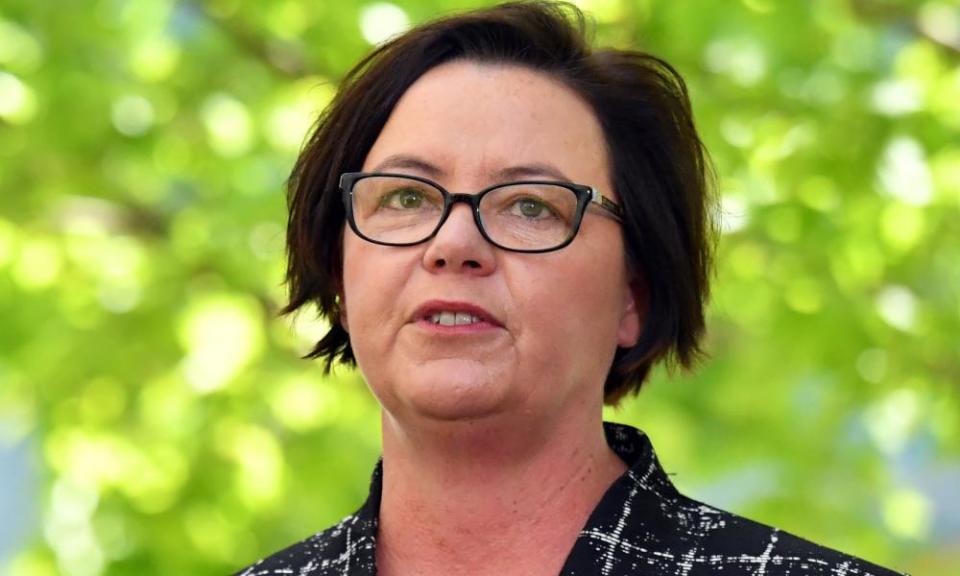Australia cannot walk away from its free trade agreement with China, Labor says

Australia cannot walk away from its free trade agreement with China as it tries to repair the “broken” relationship, the shadow trade minister has declared, while accusing the Coalition government of failing to build deep ties on the ground.
Labor’s trade spokeswoman, Madeleine King, also strongly backed the Morrison government’s plan to take China to the World Trade Organization over barley tariffs – a step that trade experts have warned could take up to three years to resolve.
In an interview with Guardian Australia the opposition frontbencher laid down some markers for how Australia should deal with the worsening tensions in the relationship with its biggest trading partner, noting that while diversifying into other markets is important, it cannot happen overnight.
The tensions have led to a range of Australian export sectors being targeted throughout the course of the year, including hefty new tariffs on wine late last week, and a dispute about an inflammatory tweet by a Chinese foreign ministry official on Monday.
Related: UK and US lock in behind Australia in China row
Dr Jeffrey Wilson, a research director of the Perth USAsia Centre, said the free trade agreement inked by the Abbott government in 2015 was “not worth the paper it’s written on today” in light of the actions taken by Beijing.
The agreement – known as Chafta – eliminated tariffs on Australian barley and sorghum when it came into force in December 2015, while also cutting imposts on Australian seafood, sheep meat and horticulture. Dairy and beef are due to have tariffs eliminated in the 2020s.
Australian wine was meant to enjoy the elimination of tariffs of 14% to 20% from the start of last year but now faces tariffs as high as 200% on the basis of claims it was dumped cheaply on the Chinese market.
King said Chafta was important because of the tariff reductions and market access it delivered in a range of sectors, even though a Labor government would have not signed up to certain provisions in the deal.
“I don’t think it should be abandoned,” she said. “It’s quite a range of products that go into China and we wouldn’t want to put that in jeopardy, even though right now a lot of them are clearly part of the trade moves by China.”
Advocates of Chafta say it has been a big success, noting the total value of Australian goods and services exports to China has nearly doubled from $87bn in 2015 to $169bn last year.
But King argued the Coalition had a “set-and-forget type of attitude to free trade agreements” where the deals were not accompanied by adequate follow-up and relationships building.
“So you can’t just sign these things, put in a little implementation scheme and think that’s the end of the story,” she said.
“The relationship needs more than signing ceremonies and special speeches and goodwill – it needs real hard work and relationships on the ground and resources on the ground.”
Guardian Australia understands Australia’s network of posts in China – including the embassy in Beijing and consulates in Shanghai, Chengdu, Guangzhou and Shenyang - remains Australia’s second largest whole-of-government presence anywhere in the world, after the United States.
The trade minister, Simon Birmingham, said the government continued to “give every possible assistance that we can at an administrative, diplomatic and political level to try to make sure that our exporters do retain the type of market access they ought to have into China”.
Birmingham said Australia still wanted to see an economically prosperous and successful China. “We also remain a country willing to have discussions and dialogue with China.”
This week Birmingham gave his strongest signal yet that Australia would launch a case at the WTO against China’s tariffs on barley.
King backed that course of action, saying it was important that Australia and China agreed to rules, and the WTO procedure was “a means of establishing common ground between our two nations”.
She said she understood it could take years to conclude and she had heard concerns from some exporters that such a step “may make things worse” in the broader trade dispute. “But then, on the other hand, how much worse can it get?”
More broadly, King said: “I think that the spirit between the two nations in terms of our general relationship is a bit broken.”
Related: Democracy wine: politicians worldwide pledge to drink Australian wine in stand against China
The phase one trade deal between Xi Jinping and Donald Trump was “the other disruptive factor” in the current environment, she said, because it obliged China to buy a certain amount of goods from the US, “which means they won’t buy that from us or from whoever”.
Wilson, from the Perth USAsia Centre, confirmed that a barley appeal could take two to three years to resolve, because “justice grinds thoroughly but very slowly” at the WTO.
The trade expert noted that the WTO appellate body already had a backlog and had been hampered by Trump blocking appointments.
But Wilson said the barley case was worth bringing because Australia had a strong case in challenging the basis upon which China had calculated the anti-dumping tariffs.
He said the WTO procedure would allow Australian partners such as Japan, the EU, the US and UK to express their support.
The wine tariffs, once finalised, and the apparent block on coal imports could also be a strong basis for other WTO challenges down the track, he said.
The ACTU secretary, Sally McManus, questioned whether Chafta had lived up to its original hype, and called for elements of the agreement to be renegotiated.
Unions led the campaign against Chafta before it came into force, arguing it would undermine Australian worker protections.

 Yahoo Finance
Yahoo Finance 